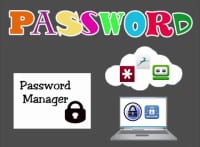Another part of my cleaning out, is tackling my digital life.
#1 – I get tons of emails. Yes, I want to read all of the ones I subscribe to and have the best of intentions, but I don’t have then time. I have started to go through the ones I really want to read. I have started to clean out ones that I never signed up for. I have achieved and deleted thousands. I don’t want my life to be tied to the computer reading emails. So I have unsubscribed from many. 
#2 – I have updated my passwords. When was the last time you changed them? I make sure to use a different one for each site. Yes, this can be challenging, but with the help of Last Pass, I can do this fairly easily. They can tell me if I have a duplicate password and the strength of my choice. They will even generate ones for me.
#3 – I have started to close accounts that I don’t use anymore. Like everyone else, I have lots of accounts with my information out there. I want to minimize this, so I am closing accounts. For example, I have closed my account with a college text book company. I finished my degree a couple of years ago and don’t have plans to rent or purchase another text book. So that account is closed. Now, more to go. My theory is the less information I have out there, the less that can be compromised.
#4 – Backing up my stuff. Many years ago, my office was broken into and my computer was broken into many pieces. Fortunately, I was able to hvae the computer restored and all information was salvageable. Ever since then I back up my files. I have a service that does this automatically for me every time my computer is on. When is the last time you backed up your files?
If you haven’t done this lately, now would be a good time to look your situation.


 In our
In our  ow about saving for …. (insert goal such as paying for college, a car, home, vacation) all the way to financial independence.
ow about saving for …. (insert goal such as paying for college, a car, home, vacation) all the way to financial independence.
 your goal to save more money for retirement or other goal? Whatever you want, January is always a good time to start.
your goal to save more money for retirement or other goal? Whatever you want, January is always a good time to start.

